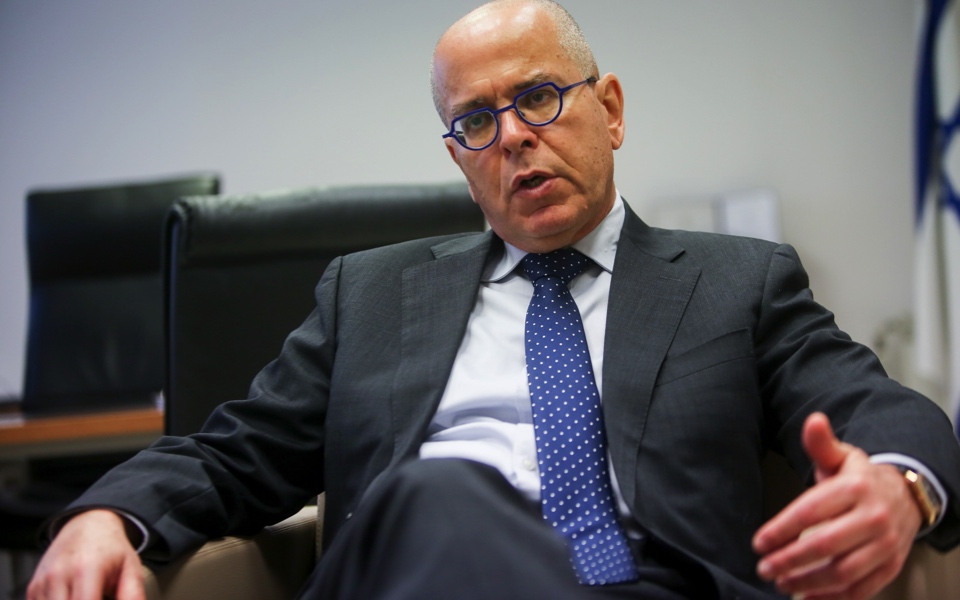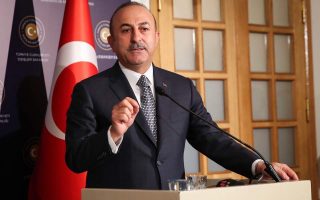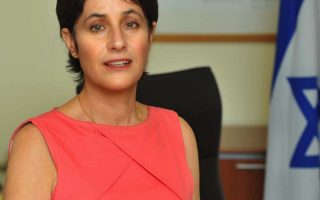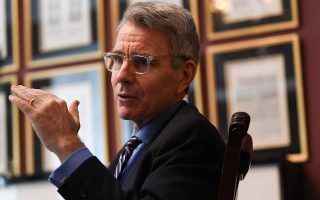Do not outsource your national interests, Israeli ambassador says

No country should rely on third parties to secure its defense and national interests, Israeli Ambassador to Greece Yossi Amrani tells Kathimerini’s Sunday edition in his first interview with a Greek newspaper.
“The Israeli experience is to trust yourself,” he says commenting on the delicate equilibrium in the wider region including Syria and the Eastern Mediterranean, particularly the Republic of Cyprus’ exclusive economic zone. Amrani stresses that stability in Syria can only be secured with the withdrawal of foreign forces from the country. Although he believes that cooperation between Greece and Israel “is at its best level in 70 years,” he sees room for improvement. The Israeli envoy says the trilateral cooperation between Greece, Israel and Cyprus as well as that between Greece, Cyprus and Egypt are cornerstones for regional policy and security in the Eastern Mediterranean.
Cooperation between Greece and Israel is already very close. What are your expectations from your tenure here? How can it evolve?
The relationship is at its best level in 70 years. The question is whether the best is the optimum or should we expect more. I think that the two countries share history, tradition, and certain national historic experiences. We are Mediterranean peoples, ancient civilizations but also modern countries with our dreams and expectations. And we live in a certain neighborhood. Life is about challenges. I think that the cooperation of the two countries on the political, strategic level is mutually beneficial. In the case of Israel and Greece, our national strengths and defense are served much better through the cooperation between the two countries, through the cooperation with Cyprus, through the cooperation via joint efforts in the Mediterranean region. This is only the strategic aspect. The other levels not of high policy and strategy are the economy, energy, academic cooperation and cultural exchanges. Much more can be done in these fields. Israelis have been experiencing and discovering Greece for many years now. Close to a million Israeli tourists visit Greece every year. One million out of a population of 9 million. Greek culture and food are very popular in Israel. We share the Mediterranean way of life with the Greeks. We need to see more Greek tourists coming to Israel. There is a will on both sides. Unfortunately, we are in a period of political transition at home. But once this is over and there is a new government in office, I think we will see the further development of our relations.
You talked about challenges. What would you describe as the most important challenge?
The economy. It is the challenge with the highest potential. I am talking about different levels of economic cooperation. I am talking about joint ventures, investments, R&D, but most importantly about infrastructure. I think that governments have a role in facilitating future economic growth, through energy cooperation, through the role of gas in the economy etc.
So you are talking about the Eastern Mediterranean pipeline?
I am talking about the EastMed, the electric cable and other frameworks of cooperation. We are in the Mediterranean region. The cooperation between Israel and Greece, between Israel and Cyprus and definitely your close relationship with Cyprus and Egypt, are cornerstones of regional policy and for creating an environment of cooperation. Cooperation in the Middle East doesn’t come naturally, there are obstacles on the way. Especially in terms of the historical Israeli-Arab ties. Greece has an important role to play in the Mediterranean and can be a certain actor in introducing a different kind of modus operandi among neighboring countries. We share the same sea, the same environment and same environment challenges. We need to explore our leverage in terms of the natural resources we possess. Cooperation can be mutually beneficial for our countries and create a framework of peace and peace dividends for all countries. We can all overcome political obstacles by introducing this multilateral framework of activities.
How does Israel view what has been happening in Syria in recent weeks? Does the shift of balance there add to instability or do you see a possible opportunity for stability at some point?
Syria has been chaotic for the last nine years. The future challenge of Syria is in maintaining its territorial integrity and sovereignty. Syria should be free of foreign forces, whether they are Iranian or Turkish. This is in the national interest of Israel. We have an interest in stability in Syria. And Syria should become part of the peace camp in the Middle East, which includes Egypt, Jordan and definitely some of the Gulf countries. We follow events in Syria very carefully. We are concerned about the Turkish military action and the attempt to establish a security zone in that part of Syria. We certainly hope that the Turkish government will respond to international calls, stop the operation and end the human suffering inflicted on the Kurdish population of Northeast Syria. We hope that the European Council and the visit of US Vice President Mike Pence will yield results. I would conclude by saying that we are following the situation in Syria very closely and we have an interest there. No one should forget that Syria borders Israel. The stability of Syria and the governance of Syria are of utmost importance for our northern frontier. Our concerns in Syria are mostly the Iranian deployment there and Iranian efforts to reach the Mediterranean via Syria and Lebanon. And we all know Iran’s rhetoric and aspirations. This recent development of the Turkish operation definitely does not contribute to peace and stability in the region.
Turkey is also conducting illegal activities in Cyprus’ exclusive economic zone. Would you say that what has been characterized as the inability of Cyprus to safeguard its designated economic zone somehow reflects on the overall cooperation between Greece, Cyprus and Israel in defense, energy etc? Do you believe that US engagement in some aspects of the trilateral cooperation is going to remain the same in coming years?
On the Turkish activity in the Cypriot EEZ, I would draw your attention to the comment of my counterpart, the Israeli ambassador to Nicosia. The message speaks for itself and I have nothing to add. Our position is very clear. We are friends with Cyprus and Greece. We hope that this conflict will be resolved peacefully and in accordance with international law. International law is very clear on this matter. And I think that the Turkish leadership should realize that there is a unified front which includes Mediterranean countries, the European Union and the US on this issue. I think that the American message in this regard, during the visit of the US secretary of state to Athens, was very clear. As for your question about policy continuity or the steadfastness of policies, in our lives we need to respond to changing realities. We realize that in our world, you may adopt different policies according to changes in governments and conditions. At the end of the day, the Israeli experience is to trust yourself. The Israeli experience is not to outsource your national interests or national defense to anyone else. And I am saying this is a message to you and our good Cypriot friends, that you should invest in your national security, develop your national strength and establish your alliances. As Foreign Minister Nikos Dendias said publicly, Greece and Cyprus are much stronger through diplomacy and alliances. In that regard, our relationship with Greece and Cyprus is for the long term. It does not have a limited timeframe. I think that geopolitics and geostrategy are here to stay. The friendship and alliance here is natural. I cannot speak for other countries, as far as they are concerned. I can just share the Israeli experience. We take care of our interests.
In terms of defense cooperation, there is already a myriad of common exercises and drills both in Greece and in Israel. How do you see that evolving?
I am not a military expert. I would like the military people to continue to lead on this matter, bearing in mind that in the last decade we have reached new heights in military cooperation. As you mentioned, it includes joint drills, an exchange of know-how, sharing of experiences and, of course, intelligence cooperation, which is very important. We have joint exercises of the navy and air force, which are mutually beneficial for Israel and Greece. We look forward to continuing the cooperation. There are exchanges of visits of experts. Let me be very honest in saying that the defense and security cooperation is one of the most important engines of our collaboration and can be further developed. Other aspects should be added to it, creating a reality of mutual benefits in a multidimensional framework.
Greece and Israel are two democratic countries, perhaps models of democracy in the region. With the rise of authoritarianism around us, it seems that Greece, Israel and Cyprus are exceptions to the regional rule. How can we claim to be pillars of stability while the political reality is so different around us?
We cannot change who we are. You are the birthplace of democracy and an ancient civilization. Israel is a state with an ancient people but a very young nation and our experience is very democratic. We cannot change. We can be a model but a very modest one. We cannot change the neighborhood. We cannot change the people next to us. And we cannot and should not make decisions about the nations neighboring us in terms of what kind of government or administration or way of life they should adopt. I think that we should invest more in people-to-people contacts in the region. I think that we should expose other countries to our way of life. We should invest in increasing economic cooperation and I think that once the economy is like that, you will see people less inclined to adopt authoritarian regimes. In the past, different efforts to export democracy or to develop a notion of capacity building have not proven to be very successful. Some countries with greater means than Greece and Israel have failed in those efforts. The key for the future of this region is stability. Part of stability is respecting the ways of life and the administration of different countries. I remember a time when President Hosni Mubarak heard a guest preaching to him about democracy or introducing democracy to Egypt. His comment was, “We are democratic and we have our own way of life.” I think that developments in the Middle East, especially in the last 10 years, prove that foreign interference in governments in different countries is a sure recipe for disasters or at least for major challenges. So, a key factor for stability in the region is the domestic stability of different countries and allowing different countries to express their way of life and government. A second element is regional cooperation among the willing, among the like-minded countries. And in this regard, Israel, Greece and Cyprus are like-minded. But that is not just because we have free elections and we are democratic nations. You can bring into this club other countries with a different way of life, or different regimes or government systems, that are also like-minded in their general perspective. Stability in our region is essential for our own immediate defense, yours and ours. It is important for the stability of the region as such, and since we live on a very small planet, it has an immediate impact on Europe and the rest of the world. Two immediate issues come to mind. One is immigration and the other, which is not necessarily connected, is terrorism. Boundaries may not be enough to put an end to terrorism. Israel plays a role of stability in the region. And the cooperation between our countries is a direct contribution to stability in Europe.





